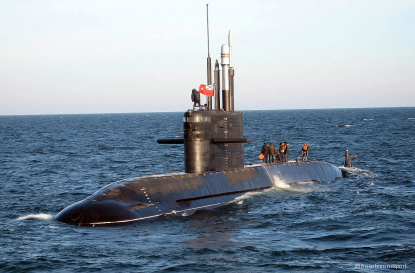Russia is keeping hopes alive for a major defense sale to Morocco—the advanced non-nuclear Amur 1650 submarine. More than a decade after Viktor Komardin, Deputy Chief of Rosoboronexport, first hinted at the deal in 2013, the project has resurfaced in 2024, sparking renewed speculation. Morocco’s evolving defense strategy makes the potential acquisition more relevant than ever.
Morocco’s modern defense vision
Over the past few years, Morocco has been steadily advancing its military capabilities. As His High Majesty King Mohammed VI highlighted during the 67th anniversary of the Royal Armed Forces, global geopolitical shifts demand constant vigilance and adaptation. “Strengthening our defensive, operational, and logistical capacities requires modern technical means and highly trained personnel to address evolving challenges,” the monarch stated.
The possible purchase of the Amur 1650 fits within Morocco’s broader defense strategy, which emphasizes not only modern technology but also a self-reliant and highly adaptable military.
The cutting-edge Amur 1650
Built by Russia’s Rosoboronexport, the Amur 1650 is a highly advanced submarine designed for multi-role operations, including anti-submarine warfare, reconnaissance, and coastal defense. The AIP version boasts impressive specifications:
- Length: 83.3 meters
- Submersion depth: 400 meters
- Speed: 19 knots
- Range: 2,000 miles submerged at 5 knots
Its capabilities rival the best in the industry, making it a strong contender for Morocco’s growing naval fleet.
Fierce competition in the submarine market
Russia isn’t the only player vying for Morocco’s attention. Several global defense giants have put forth competing offers, each bringing distinct technological advantages.
- France: The French Scorpène, developed by Naval Group, stands out with its stealth features and cutting-edge sonar systems. With lithium-ion battery options, it offers unparalleled underwater endurance and minimal acoustic signature.
- Spain: The Spanish S-70 Agosta class, while slightly older, remains a reliable option with a range of 9,000 nautical miles and the ability to operate for 45 consecutive days.
- Germany: Germany’s defense industry also provides highly competitive models, renowned for their efficiency and advanced engineering.
Morocco’s growing military budget
The Kingdom’s defense ambitions are supported by a robust budget. In 2023, Morocco allocated 119.8 billion dirhams ($11 billion) to defense—an increase of 4 billion dirhams from the previous year. This significant investment reflects the country’s commitment to technological advancement and operational readiness.
Defense as a strategic and economic asset
Morocco’s focus on defense extends beyond military needs. A study by the Policy Center for the New South highlights the economic potential of the defense industry, noting that the sector’s high spending creates opportunities for local development. However, the primary goal remains strategic: achieving autonomy in defense production to safeguard national sovereignty.
The road ahead
As Morocco considers its options, the stakes are high. Acquiring advanced submarines like the Amur 1650 would enhance the Royal Navy’s capabilities, securing vital maritime interests. More broadly, it would align with Morocco’s vision of developing a cutting-edge defense industry, fostering partnerships, and solidifying its status as a strategic power in the region.
Whether the Russian offer materializes remains to be seen, but one thing is certain: Morocco’s defense strategy is not just about military might—it’s about preparing for a future where technology and sovereignty go hand in hand.
